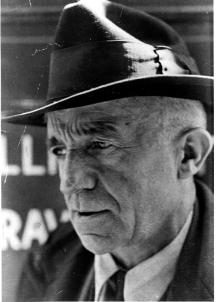Peter Maurin

(1877-1949)
Faithful Catholic and Social Philosopher
WHO IS PETER MAURIN?
Many people have heard the name Dorothy Day, who was the co-founder of the Catholic Worker Movement. What many people don’t know is that Dorothy credits much of her Catholic life, social philosophy, and inspiration to the man whom she also called the single greatest influence in her life, Peter Maurin. Part of the mission of the Center for Catholic Social Thought is to articulate Maurin’s vision and show why it is such a compelling and relevant approach to Catholic social teaching, and to the world.
MAURIN'S LIFE
Maurin was a Frenchman, one of 22 (!) children who grew up as a peasant and, after a time in France in a religious order and involved in social movements, came to America after the turn of the last century. He had undergone something of a second conversion, and, under the influence of the Church’s social teaching sold much of what he owned and traveled the country with a mission to take that social teaching “to the man in the streets.”
Maurin met Dorothy Day in 1933, in the throws of the homelessness and poverty of the great depression, in New York City. Together they started the Catholic Worker Movement, which consisted of a newspaper (The Catholic Worker) for popularizing Catholic social teaching, houses of hospitality for the immediate relief of the poor, discussion groups for the clarification of thought, and farms where people could re-learn the connection with the land. Day often credited Maurin with being the real “founder” of Catholic Worker, and it was indeed on his learned and deeply Catholic theological vision that the movement, and much of Dorothy’s own thought, was based.
FAITHFUL CATHOLICS
Maurin and Day lived in voluntary poverty themselves among the poor, and often offered trenchant critiques of the social order of the day. And this radical life was rooted for them in their deep commitment to the Church and all its teachings. Both of them went to daily Mass and spent hours each day on their knees. This is important to point out, because sometimes today the Catholic Worker Movement is known for having less than a full commitment to orthodox Catholicism, or for being sort of on the margins of the church. In the eyes of its founders, however, it was meant to be at the very heart of the Church, committed not only to the tradition and to prayer, but to the works of mercy, community, and the social embodiment of the Gospel as well. The “radical” nature of Maurin’s life simply resulted from the extension of the logic of liturgy into every part of his life.